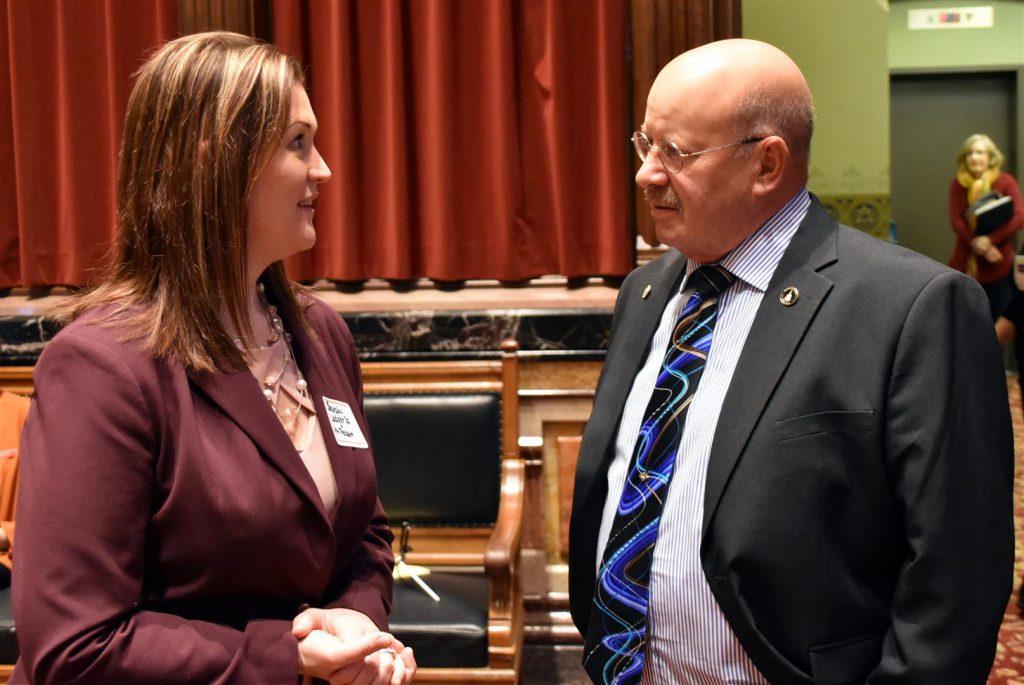By Senate Intern Kylie Spies, University of Iowa MSW student

Women in Henry County soon will have to travel an hour to Iowa City or Ottumwa to give birth. In labor and delivery, every minute can be critical. Sarah Ledger of Mount Pleasant, a physician with Henry County Health Center, talks with State Sen. Rich Taylor about the consequences of closing obstetrics units in rural Iowa.
Rural Iowa hospitals are struggling to keep their doors open, and family practice doctors are on the front lines. Dr. Sarah Ledger, D.O., visited the State Capitol to tell legislators about the challenges Iowa families and doctors are facing.
Dr. Ledger provides prenatal care to southeast Iowa women at Henry County Health Center in Mount Pleasant. HCHC will close the doors to its maternity unit in June, leaving another Iowa community without a safe place to have a baby.
Henry County Health Center is a Top 100 Critical Access Hospital in the United States. Critical Access Hospitals are small rural hospitals at least 35 miles from another facility. They have 25 beds or fewer, and must offer 24/7 emergency services. In rural Iowa, these hospitals may be a matter of life and death in a crisis.
Dr. Ledger says that because of the way Medicaid providers pay hospitals for maternity services, they are sometimes forced to close their labor and delivery units to keep the rest of the hospital afloat. It takes a lot of staff and hospital resources to be ready to deliver a baby at any time. If Medicaid payments don’t cover the costs or aren’t made quickly, rural OB units suffer.
Critical Access Hospitals are supposed to receive higher rates of payment for their services because they are so vital to the community. But profit-driven private Medicaid providers have squeezed hospital budgets so tightly that they can no longer serve Iowans.
“You abandon OB to keep your hospital open,” says Dr. Ledger. “We’re running into the same thing with our EMS services. We run into the same thing with some of our inpatient care units. You have to cut back on the services that you provide to keep your hospital open. And we’re seeing hospitals that are still closing.”
Dr. Ledger says women are at higher risk of health problems like high blood pressure and premature births than they were 20 years ago. She sees patients living with violence and hunger, and many without a vehicle for traveling to appointments.
Good prenatal care is crucial for the health of moms and babies. Regular appointments during pregnancy allow doctors and midwives to monitor patient health, educate moms, and prepare them for labor and newborn care. Without access to prenatal care, Iowa women and their babies face serious health risks.
“These women come in and we have no idea what the potential complications are going to be. It increases the cost of health care overall because we’re not prepared. We haven’t taught these moms how to take care of their babies. We haven’t taught these moms how to take care of their bodies. You see more complications with that.”
Women in Henry County soon will have to travel an hour to Iowa City or Ottumwa to give birth. In labor and delivery, every minute can be critical.
“It is much safer to deliver these babies in a stable OB unit with a trained OB clinician, rather than an ER, in the back of an ambulance, or in a personal vehicle on the side of the road,” says Dr. Ledger.
The shortage of maternity units in rural Iowa puts moms and babies at risk.
Iowa ranks 50th out of the 50 states in the number of OB-GYNs per capita. Two-thirds of Iowa counties don’t have a single OB. Combined with the 34 closures of rural Iowa maternity units since 2000, Iowa has a serious care crisis. Dr. Ledger is asking the Legislature to fix Iowa’s Medicaid mess to protect rural hospitals.
“We need more support with our Critical Access Hospitals. We need more money, unfortunately we need higher reimbursement,” she says.
“We pay a lot of money to these private MCOs, and we are getting less and less.”
Sources
www.ruralhealthinfo.org/topics/critical-access-hospitals
www.arcgis.com/apps/webappviewer/index.html?id=52284a7453eb46b79149c1571d2d5e1b